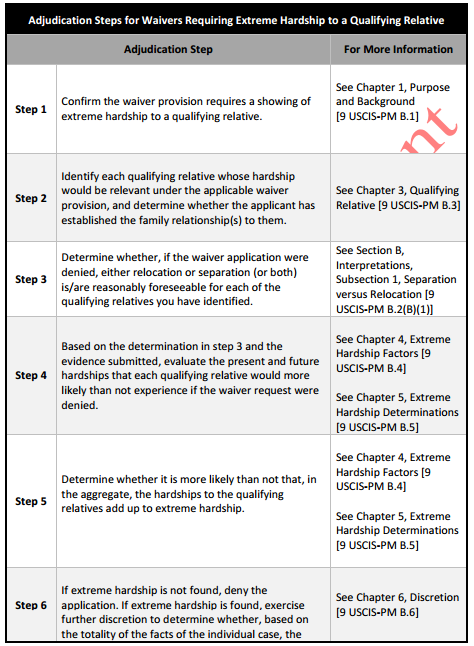Yesterday, USCIS released a draft version of what will eventually be used as the policy manual guide of extreme hardship. The policy manual has been created for the purpose of assisting adjudicating officers in making final determinations on the merits of waivers of inadmissibility. Certain aliens, who are found to be inadmissible under specific grounds of the law, can apply for a discretionary waiver in order to adjust their status to permanent residence. In order to do so, the alien must demonstrate their relationship to a qualifying relative (US Citizen or LPR family member) and establish that the qualifying relative would experience an “extreme hardship” in their absence. The policy manual includes guidance relating to general considerations, interpretations of existing law, and adjudication steps that will help consular officers establish whether a waiver of inadmissibility merits a favorable decision and whether the burden of proof has been satisfied by the applicant. The draft highlights important requirements that must be taken into consideration by adjudicating officers when considering the merits of a waiver application. Such requirements include 1) whether the alien has demonstrated that they possess a qualifying relative 2) the presence of an extreme hardship to the qualifying relative and 3) discretionary measures based on the totality of the facts presented. USCIS has invited the public to comment on the draft from now until November 23, 2015.
The following provisions of the Immigration and Nationality Act (INA) authorize discretionary waivers for aliens that have been found inadmissible on the particular grounds specified below:
• INA 212(a)(9)(B)(v) – waives the three-year and ten-year inadmissibility bars for unlawful presence. Eligible qualifying relatives include the applicant’s U.S. citizen or LPR spouse or parent.
• INA 212(h)(1)(B) –waives inadmissibility for crimes involving moral turpitude, multiple criminal convictions, prostitution, commercialized vice, certain serious criminal offenses for which the foreign national received immunity from prosecution, controlled substance convictions for a single offense of simple possession (30 grams or less of marijuana). Eligible qualifying relatives include the applicant’s U.S. citizen or LPR spouse, parent, son, or daughter.
• INA 212(i)(1) –waives inadmissibility for certain types of immigration fraud. Eligible qualifying relatives include the applicant’s U.S. citizen or LPR spouse or parent
In the manual USCIS has outlined clear steps that an adjudicating officer must consider when determining the merits of a discretionary waiver of inadmissibility, factors, and considerations to be taken into account to establish whether the qualifying relative will suffer an extreme hardship in the absence of the alien. The factors are: family ties and impact, social and cultural impact, economic impact, health conditions and care, and country conditions.
Still have questions? We invite you to watch our videos on Extreme Hardship Waivers on our Youtube channel by clicking here. For eligibility concerns please contact our office.
 Visa Lawyer Blog
Visa Lawyer Blog








